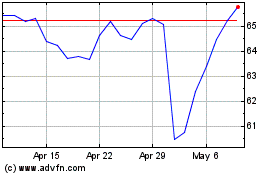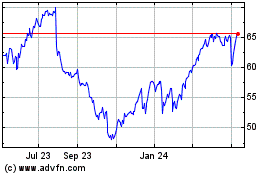By Joann S. Lublin And David Benoit
Edward D. Breen, the new temporary leader of DuPont Co., knows a
lot about breaking up big businesses, a skill he could put to use
at the chemicals conglomerate that has fought off calls for a split
for most of this year.
During his decadelong tenure as chief executive of Tyco
International Ltd., Mr. Breen, now 59, broke up the company
twice.
First, in 2007, when Tyco was a $41 billion conglomerate with
nearly 240,000 employees, he split it apart, hiving off two units:
a medical-products company which became Covidien PLC and an
electronics-component maker, now known as TE Connectivity Ltd.
The second time around, he spun off its ADT residential-alarm
business and a unit that made industrial valves and pipes, leaving
Tyco as a provider of security and fire systems--a comedown for a
company that bought hundreds of businesses over five decades.
"He's not shy about doing breakups," said Michael Useem, a
management professor at University of Pennsylvania's Wharton School
who has known Mr. Breen for years and advised Tyco about governance
issues.
Shares of DuPont rose 7.7% Tuesday, its biggest one-day
percentage gain since 2009, but the stock remains down 21% for the
year.
Mr. Breen, who joined DuPont's board in February, takes over
next week on an interim basis as CEO and chairman from Ellen
Kullman who Monday announced her surprise retirement. Ms. Kullman
survived a bitter proxy fight waged this spring by Nelson Peltz's
Trian Fund Management LP, which had sought to split the
213-year-old maker of Kevlar fibers and Pioneer corn seeds into two
separate businesses, one focused on agriculture and the other on
industrial materials.
Ms. Kullman--with the support of DuPont's board of directors,
including Mr. Breen--prevailed in the proxy vote that rejected
Trian's strategy and opposed the fund's attempt to nominate
directors for the board. But the company's results worsened and Ms.
Kullman ultimately agreed to step down.
Now as Mr. Breen takes the reins as interim CEO, his previous
support for keeping the company together may evolve especially in
the face of deteriorating results. While announcing the CEO change
Monday, DuPont also lowered its earnings forecast for this
year.
During a conference call after Monday's announcement, Mr. Breen
said he planned "a deep dive" into DuPont's cost structure and to
evaluate its investment decisions to make sure shareholders get
appropriate returns.
In the past, he has defended DuPont's structure and credited Ms.
Kullman with already restructuring the company.
In a company presentation for investors earlier this year, he
was quoted as saying that at Tyco "we faced a very different set of
facts" that "required extreme measures."
Mr. Breen is committed "to effective decision-making based on
the specific facts and circumstances of that particular company," a
DuPont spokeswoman said Tuesday.
On a call Monday with analysts, Mr. Breen said his appointment
as interim CEO shouldn't be a signal for strategy change.
"I would not read anything into that," he said.
Even so, analysts and investors couldn't help but read into it.
Deutsche Bank analysts in a report Tuesday said they view a breakup
as "highly likely" because Ms. Kullman was viewed as "the single
biggest impediment, in our view, to a breakup of DuPont."
Citigroup analysts said in a report they see "significant
strategic changes" and suggested that splitting up like Trian
suggested could lead the separate agricultural company to find a
deal with Dow Chemical Co.
Former colleagues at Tyco recall Mr. Breen being a
detail-oriented executive who kept a close eye on operational
matters and held nothing sacred. Bruce Gordon, a former Tyco
director who now is chairman of the spun-off ADT Corp., recalled
how Mr. Breen knew everything from the size of each unit's sales
force to its customer attrition rate.
When he assumed the helm at Tyco, Mr. Breen had to make some
tough decisions. The former Motorola Inc. president took over from
L. Dennis Kozlowski in 2002, who lost his job amid imminent charges
of sales-tax evasion. That probe grew into a bigger case, and Mr.
Kozlowski was criminally convicted of systematically looting the
company and served more than six years in prison.
In the face of a liquidity crisis and accounting mess, Mr. Breen
cast the deciding vote to replace the entire Tyco board and shed
almost 300 people at the corporate headquarters.
At DuPont, Mr. Breen "will get down very deeply into these
businesses," and decide whether all of DuPont units "are worth
keeping," said Jack Krol, a retired DuPont CEO who was Tyco's lead
independent director during most of Mr. Breen's tenure.
It wasn't immediately clear if Mr. Breen--who remains Tyco
chairman and is the lead director for Comcast Corp.--wants to be
considered for the permanent top spot at DuPont. However, "Ed will
participate in the search for the new CEO," the company spokeswoman
said.
DuPont's next boss will still have to contend with Trian. The
fund has continued to buy shares in DuPont even after losing the
battle for board seats, said Ed Garden, Trian's chief investment
officer in a CNBC interview before Monday's announcement. Trian
declined to comment.
Despite backing the breakup of Tyco, Mr. Breen isn't in favor of
splitting apart companies in response to activist pressure. "If
activists find a weakness, they jump," he said during a 2012
interview with The Wall Street Journal. "It is not the most elegant
way to get it done."
Write to Joann S. Lublin at joann.lublin@wsj.com and David
Benoit at david.benoit@wsj.com
Subscribe to WSJ: http://online.wsj.com?mod=djnwires
(END) Dow Jones Newswires
October 06, 2015 20:08 ET (00:08 GMT)
Copyright (c) 2015 Dow Jones & Company, Inc.
Johnson Controls (NYSE:JCI)
Historical Stock Chart
From Mar 2024 to Apr 2024

Johnson Controls (NYSE:JCI)
Historical Stock Chart
From Apr 2023 to Apr 2024
